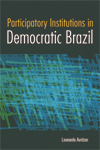Book Launch: <i>Participatory Institutions in Democratic Brazil</i>
Leonardo Avritzer, Associate Professor of Political Science at the Federal University of Minas Gerais
Overview
 Brazil's much-celebrated participatory budget is not a one-size-fill-all solution for democracy, according to the book "Participatory Institutions in Democratic Brazil," launched on Jan. 28 at the Wilson Center. Author Leonardo Avritzer, associate professor of political science at the Federal University of Minas Gerais in Brazil, examined the experiences of four Brazilian cities to investigate the conditions for success and failure in participatory budget. He argued that it all comes down to context.
Brazil's much-celebrated participatory budget is not a one-size-fill-all solution for democracy, according to the book "Participatory Institutions in Democratic Brazil," launched on Jan. 28 at the Wilson Center. Author Leonardo Avritzer, associate professor of political science at the Federal University of Minas Gerais in Brazil, examined the experiences of four Brazilian cities to investigate the conditions for success and failure in participatory budget. He argued that it all comes down to context.
The book, mostly written during Avritzer's residence at the Wilson Center as Public Policy Scholar in 2006, focused on participatory councils and city master plans in Porto Alegre and Belo Horizonte -- two cities renowned for citizen participation-- and in São Paulo and Salvador -- two cities where the experiment did not generate the same positive results.
"The right question is not whether all the other cities can reproduce the experiences of Porto Alegre and Belo Horizonte," Avritzer said, "but it is rather why most of the other cities cannot reproduce these experiences."
The case for low participation in São Paulo and Salvador
 Avritzer explained that the key to understand the failure of participation in São Paulo is the political system. Since the end of the military regime, São Paulo has not been governed by the same party for two straight administrations -- unlike Porto Alegre and Belo Horizonte, where there was a long-term continuity from one administration to the other.
Avritzer explained that the key to understand the failure of participation in São Paulo is the political system. Since the end of the military regime, São Paulo has not been governed by the same party for two straight administrations -- unlike Porto Alegre and Belo Horizonte, where there was a long-term continuity from one administration to the other.
"One of the consequences of this shift between left and right in São Paulo is that even the Worker's Party [which is often associated with participatory budget] is not willing to bet on political participation because processes of participation take longer to deliver, because the Worker's Party always needs to craft alliances to govern the city of São Paulo… and this collides with the process of participation," Avritzer said.
Another key factor for low participation in São Paulo, Avritzer argued, is that civil society is unevenly organized in comparison to Porto Alegre and Belo Horizonte. Although São Paulo had a history of strong civil society organization sponsored by the Catholic Church, participation became fragmented after the division of the archdioceses in four parts during the 80s, he noted.
In contrast, Salvador, the capital of Bahia state, has been marked by a weak civil society and a long tradition in political conservatism. Avritzer said there is an old oligarchy that still exists in Salvador, linked to a group associated with the late Antonio Carlos Magalhães, a former governor, minister and mayor. He added, "This political group has always been against any form of social participation."
In his book, Avritzer revealed that participatory budget does not work in cities were political systems are not united behind processes of political participation and in which civil society is strongly divided or not homogenous.
However, there are other forms of participation that work. Avritzer cited, for example, the health councils in São Paulo, which perform well in spite of opposition by the mayor and the political system.
"São Paulo shows to us that in places where politics is contentions and civil society not well represented, other forms of participation based on mandatory participation, legal institutionalization of participation work better than participatory budget," Avritzer concluded with the suggestion that participation should be adapted according to context.
Documents & Downloads
Hosted By

Brazil Institute
The Brazil Institute—the only country-specific policy institution focused on Brazil in Washington—works to foster understanding of Brazil’s complex reality and to support more consequential relations between Brazilian and US institutions in all sectors. The Brazil Institute plays this role by producing independent research and programs that bridge the gap between scholarship and policy, and by serving as a crossroads for leading policymakers, scholars and private sector representatives who are committed to addressing Brazil’s challenges and opportunities. Read more
Thank you for your interest in this event. Please send any feedback or questions to our Events staff.










